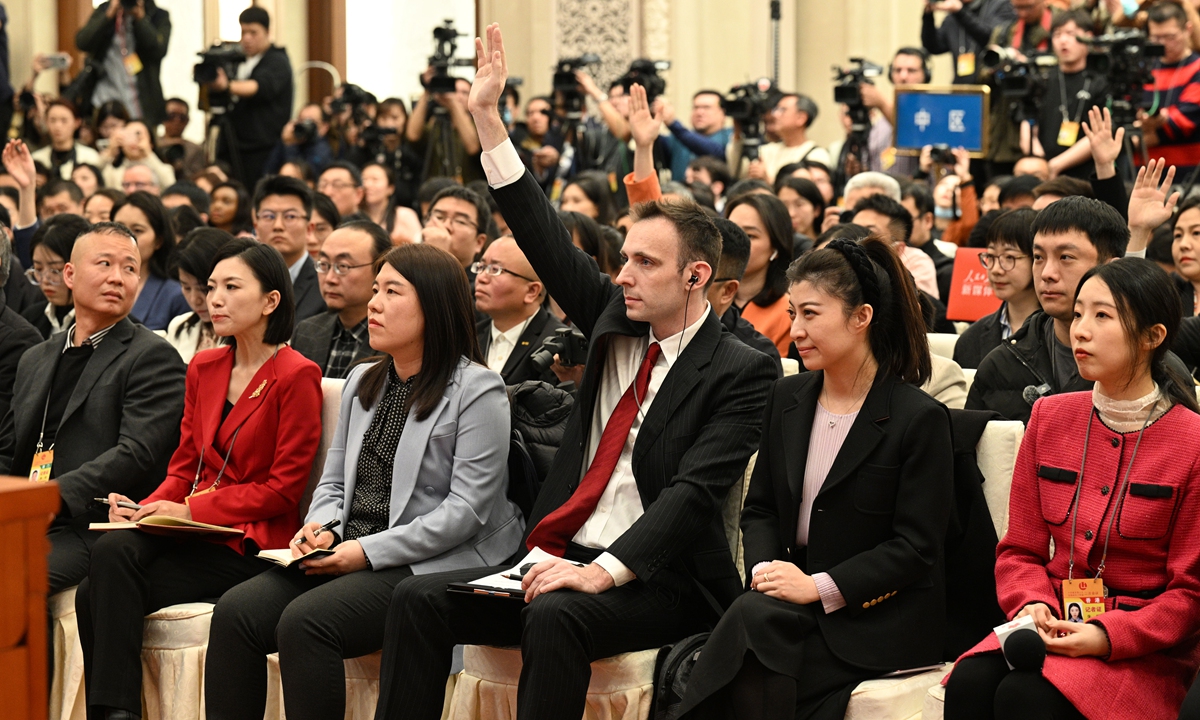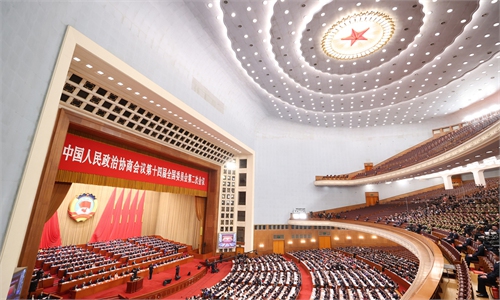NPC spokesperson urges US to work with China for healthy, stable ties
Legislative, civilian exchanges ‘vital for mutual understanding’

A foreign journalist raises his hand to ask a question at the news conference for the second session of the 14th CPPCC National Committee at the Great Hall of the People in Beijing on March 3, 2024. More than 3,000 reporters from home and abroad have registered to report on this year's two sessions, a significant increase compared to previous years. Photo: VCG
No matter who becomes the president, we hope that the US can work in the same direction with China for a stable, healthy and sustainable China-US relationship, said Lou Qinjian, spokesperson for the second session of the 14th National People's Congress (NPC).
At the press conference on Monday, one day before the key meeting, Lou said that stabilizing and improving China-US relations is something that everyone follows closely and expects to see. China's position has been consistent, which is to follow the principle of mutual respect, peaceful coexistence and win-win cooperation.
"We have taken concrete actions toward that. It is hoped that the US will honor its commitment, strengthen the five pillars in China-US relations and translate the understanding and vision agreed on by the two presidents in San Francisco into real actions," Lou stated.
In response to an American reporter's question on the US elections, the spokesperson said that the US presidential election is an internal affair of the US, and China does not hold a position on it. "No matter who becomes the president, we hope that the US can work in the same direction with China for a stable, healthy and sustainable China-US relationship," Lou stressed.
At the same time, he mentioned that ordinary Chinese people often see members of the US Congress put forward bills targeting China, adopt anti-China rhetoric and deeds against Chinese institutions, companies and nationals, and even visit China's Taiwan region.
These actions have severely interfered in China's internal affairs, undermined China's legitimate rights and interests, and disrupted normal exchanges and cooperation between the two countries, Lou pointed out, noting that in response, the NPC has made clear its opposition through statements and other channels.
The spokesperson also put forward expectations of more exchanges between the legislatures of China and the US in the future.
He said that over the past years, the two countries' legislatures have maintained interaction despite many difficulties. One example is the visit of a bipartisan delegation led by Senate majority leader Chuck Schumer to China.
"This year marks the 45th anniversary of the establishment of China-US diplomatic relations. It is important for the legislatures of the two countries to have more exchanges, dialogue and communication to deepen mutual understanding and play a constructive role in the stable development of China-US relations," Lou said.
The US is more provocative in meddling in the internal affairs of other countries, some Chinese analysts said, citing Washington's use of the "Taiwan card" in an attempt to contain Beijing as an example.
Considering 2024 is a US election year, the biggest challenge for China-US ties this year is the political turmoil in the US, and anti-China sentiment and efforts to restrict China's development are gaining more momentum in the country, warned Lü Xiang, a research fellow at the Chinese Academy of Social Sciences.
"We certainly hope that whoever is elected will prioritize maintaining a constructive relationship with China. However, regardless of who is elected next, anti-China policies may intensify. China does not want to see this situation escalate and will respond in its own way," the expert said.
He noted that in fact, there is an inherent need for the US to establish friendly relations between the two countries, but some politicians have hyped up hostility for their own gains.
Therefore, in addition to the necessary development of normal relations between the two governments, it is also important to increase mutual understanding through legislative, civilian, and academic exchanges, Lü suggested.
While China has expressed its sincerity for healthy and sustainable bilateral ties, some US politicians always follow the Cold War mentality and see China as a "rival" or even an "enemy."
In a recent interview with American media outlet CBS late February, US Ambassador to China Nicholas Burns said China is the US' most significant competitor.
"I think ultimately, they [China] want to become and overtake the United States as the dominant country globally," Burns said. "And we don't want that to happen. We don't want to live in a world where the Chinese are the dominant country."
Chinese Foreign Ministry spokesperson Mao Ning rejected Burns' remarks on Monday, saying they are "neither fact-based nor constructive."
"We oppose defining the China-US relations with competition. China does not engage in major-country competition, and has no intention to replace or challenge any country. We have advanced the China-US relations under the principles of mutual respect, peaceful coexistence and win-win cooperation proposed by President Xi Jinping," Mao stated.
Mao stressed that China always believes that all countries, big or small, rich or poor, are equal members of the international community.
"China will not dominate the world and we do not think the world should be dominated by any country. Neither does China have the intention to overtake the US. What we do are aimed at self-improvement so as to deliver a better life for our people." Mao said.


